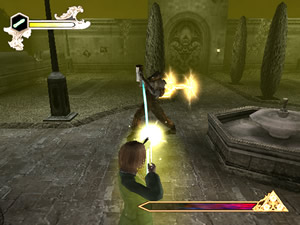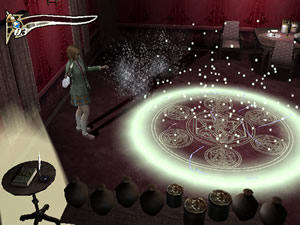Ding dong, the witch is mutilated.
Kinji Fukasaku must have had it rough as a child. He made a name for himself by
gleefully unleashing a torrent of death and destruction upon scores of youthful
adolescents in the cult favorite Battle
Royale. As director of the in-game cinemas in Clock Tower 3, he
has continued his dark, macabre torture of innocents to great effect. Never before
has a video game fully earned its Mature rating with such gusto. None of the maggot-ridden,
zombie-infested, mutating toothy slime beasts of the Resident
Evil or Silent Hill series of games can hold
a shaky candle to the graphic depiction of sinister murder perpetrated by the
bad guys in Capcom’s Clock Tower 3.
Sweet little old ladies are liquefied in vats of acid, and other hapless citizens
are chopped, sliced, diced and pureed with reckless abandon. Not even a cute
12 year-old girl is spared from being whopped on the head with a huge sledgehammer.
Kind of makes you wonder just how long Fukasaku sat on the bench when they were
choosing sides for dodgeball.
In
this most recent installment in the Clock Tower series, you play as 14
year-old Alyssa Hamilton, a nobody in the real world but an apparent celebrity
in the land of the dead, as everybody there seems to know her name and damn
near wears it out. After receiving a letter from her mother warning her to stay
away, Alyssa returns home to find out what the hoo-hah is about. While there
she encounters a mysterious “Dark Gentleman” with a head like a canned ham and
begins her joust with fear, mayhem and death.
Alyssa comes from a private boarding school; she’s no alumnus of West Point.
The intricacies of firearms, explosives and hand-to-hand combat were not in
the curriculum. In fact, she doesn’t actually have any real means of defending
herself – except in Boss Battle mode, in which she will suddenly find herself
equipped with a magical bow and a neverending supply of Spirit Arrows. She doesn’t
even have a decent melee bookbag.
Instead, she must rely on rationed Holy Water and a variety of unremarkable
objects scattered throughout the environments. If your idea of a good time is
some wacko tailgating your helpless butt with the intent of doing you grave
physical harm, then you should enjoy this frustrating romp through murky old
London, because that is basically the gist of this game.
In a departure from previous Clock Tower games (which were all point-and-click),
Clock Tower 3 opts for a more Resident Evil-style control set
up. Although direction is confined to the slippery analog stick, all other buttons
are completely configurable. Control is simple and incorporates just a few buttons.
And since you are incapable of doing anything like jumping or climbing without
a prompt screen, it won’t take you more than a second to get the hang of it.
Through most of the game you have a Panic Meter instead of a standard life
bar, although in Boss battles your life bar will replace your Panic Meter. During
regular play, the Panic Meter functions to let you know just how frightened
Alyssa feels. This is key because once your Panic Meter is maxed out, Alyssa
basically loses it. Her vision becomes blurred, she will run out from any place
she happens to be hiding, pause at inopportune moments to quiver in terror,
and will generally become quite obstinate when it comes to control – very similar
to the insanity effects in the GameCube’s Eternal
Darkness, though not as well done. While the baddies cannot literally wound
Alyssa, she will perish from fear with a single blow while she is freaking out.
Managing her Panic Meter is a major factor of gameplay.
The puzzles are fairly simple. If you happen upon a locked door, the key is
dependably close at hand. Even if doors are magically sealed, a little dab of
Holy Water will get you on the other side (if that’s where you need to be).
As in Resident Evil, items will generally glow to indicate their usefulness.
You can be guaranteed that you will not be up all night looking for a pair of
pliers or a diagram to solve a tricky wire hook-up puzzle. A handy map helps
you to navigate through detailed environments. Save rooms abound, as well as
locations to refill your always-diminishing supply of Holy Water.
 From
From
time to time you will encounter a horribly murdered body with a restless spirit
lurking nearby. You merely need to figure out what object they are missing and
return it to them. Whatever it is, it’s probably not far from the corpse and
it doesn’t take a genius to surmise that an ’empty ring box’ will require a
ring. Often a note of some kind will let you know what item goes where, anyway.
Without these items the spirits remain in wickedly bad moods and can hinder
your progress. In fact, you cannot finish the level as long as even one of them
is missing their item. The benefit to helping them out, aside from the warm
and fuzzy feeling you get from doing a good deed, is that each of them will
leave something behind that you will find useful during the course of the game.
Fairly early on in each level, the crazed killer who created the corpses will
pop in to introduce himself to our intrepid heroine, and then proceed to chase
her relentlessly as she’s busy trying to locate “sentimental items” and solve
the various puzzles. Rather than being necessarily creepy, these “Subordinates”
of the Dark Gentleman are more of the lunatic variety. They are always heralded
by special “danger music,” which is far too much of a tip off as to whether
the evildoer is still prowling around looking for you or has paused for a few
minutes to take a well-deserved toilet break.
Not a single bad guy is capable of blending into a crowd. They come in outlandish
costumes and wield obvious and malignant weapons. The fear factor is much more
reliant upon your attacker’s sheer agility, speed and sometimes Matrix-like
talents coupled with the limited options in your own movement palette. You are
restricted to hiding in plain sight, flinging sprinklings of Holy Water, crawling
through tight spaces and the old, faithful standby of simply running away. It
doesn’t help that most of your pursuers seem to be faster than you are.
Hiding is sometimes your best option, but forget about selecting a devious
spot to hide in, as the pre-rendered backgrounds are generally not interactive
and the bad guy will no doubt find you anyway. Predetermined “hiding places,”
though most likely out in the open, are indicated by incandescent swirls and
no matter how obvious you may feel you are being, enemies will be completely
mystified as to your whereabouts as long as your Panic Meter is kept in check.
Boss battles can be long exercises in tedium. You cannot move or adjust your
aim while powering up your Spirit Arrows. Of course, your foes don’t seem to
possess this handicap. You can expect lots of running around, trying to discern
a pattern, and then attacking whenever you can get a clear shot.
Though the cinematics and in-game graphics are both done well, Clock Tower
3 is ultimately one of those games whose cinemas are more interesting than
the actual gameplay and from a gamer’s standpoint, that’s never a good thing.
If I want to watch a movie, I’ll watch a movie – but I came to play.
The game is short, too, making it a bit of a rough one to recommend. It is
possibly a rental and definitely capable of being finished in a short weekend
with plenty of time off for meals, sleeping and maybe a showing of Battle
Royale.
-
Gorgeous, gory delivery
-
Simple control
-
Plenty of Save rooms
-
Short, lackluster gameplay
-
Character moves slower than she should
-
Music gives away surprises







